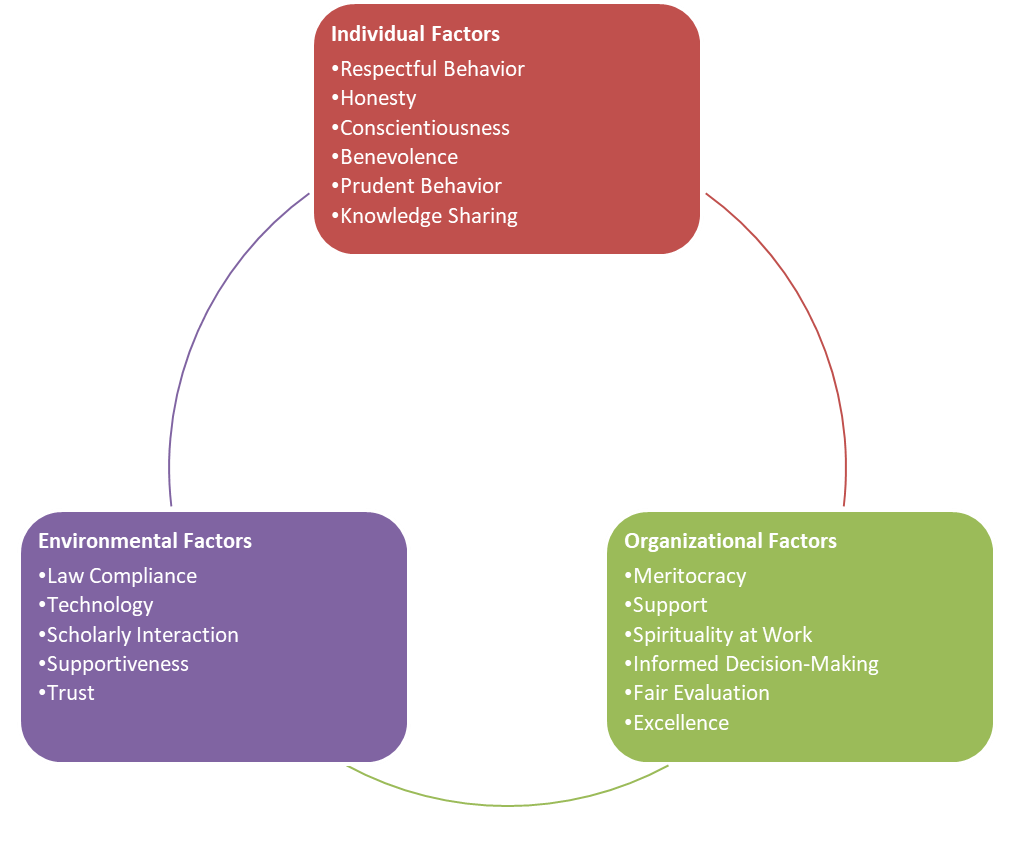Designing an Open Innovation Model Based on Sustainable Ethical Behaviors Using Textual Content Analysis Approach
Keywords:
open innovation, sustainable ethical behaviors, textual content analysisAbstract
Given the unrestricted nature of knowledge in today's world and the dissolution of rigid boundaries between organizations and even countries, the concept of closed innovation has been replaced by open innovation. Organizations are transitioning from closed innovation to open innovation, which represents one of the most complex stages of the innovation process. Sustainable business ethics is considered a crucial issue for organizations, and the lack of recognition of its related indicators can lead to negative consequences in society. The present study aims to design an open innovation model based on sustainable ethical behaviors using a textual content analysis approach. Accordingly, 45 domestic articles and 77 international articles were utilized. Based on the content analysis approach, the identified factors include individual factors with six criteria (respectful behavior, honesty, conscientiousness, benevolence, prudent behavior, and knowledge sharing), organizational factors with six criteria (meritocracy, support, workplace spirituality, informed decision-making, fair evaluation, and excellence), and environmental factors with five criteria (law compliance, technology, scholarly interaction, supportiveness, and trust). These factors collectively contribute to open innovation based on sustainable ethical behaviors.
References
A. I. Zahari, J. Said, N. Muhamad, and S. M. Ramly, "Ethical culture and leadership for sustainability and governance in public sector organisations within the ESG framework," Journal of Open Innovation: Technology, Market, and Complexity, vol. 10, no. 1, pp. 1-11, 2024, doi: 10.1016/j.joitmc.2024.100219.
E. Khan Mohammadi, R. Moradi, S. S. Beheshti, and H. Akvani, "Critical Discourse Analysis of the Representation of Iranian Ethical Behaviors in Morality Writing Texts," Sociology of Culture and Art, vol. 4, no. 3, pp. 164-185, 2022.
M. Kabirian, "The Process of Professional Ethics Development in Midwifery Students: A Grounded Theory Study," Iranian Journal of Nursing and Midwifery Research, vol. 29, no. 3, pp. 302-308, 2024, doi: 10.4103/ijnmr.ijnmr_12_23.
M. Mohammadi Fomani, A. Sharifi, and A. a. Etemad Ahari, "Development, Validity, and Reliability Assessment of the Professional Ethics Scale for Faculty Members of Farhangian University," (in eng), Iranian Journal of Educational Sociology, Research Article vol. 7, no. 2, pp. 8-15, 2024, doi: 10.61838/kman.ijes.7.2.2.
Y. Wang, "Ethical Concepts in the Tao Te Ching and Professional Ethics Education: Principles, Challenges, and Opportunities," The Educational Review Usa, vol. 8, no. 2, pp. 232-236, 2024, doi: 10.26855/er.2024.02.006.
M. Tajari, A. Zahed Bablan, T. Akbari, and M. Moeini Kia, "Designing and Validating the Model of an Open University Based on the Open Innovation Paradigm: A Mixed-Method Approach," Public Management Research, vol. 15, no. 57, pp. 235-261, 2022.
U. H. Westergren and J. Holmström, "Exploring Preconditions for Open Innovation: Value Networks in Industrial Firms," Information and Organization, vol. 22, pp. 209-226, 2022, doi: 10.1016/j.infoandorg.2012.05.001.
M. Akbari, S. Alizadeh Moghadam, and A. Zolfaghari, "Policy-Making for Open Innovation Development: Requirements for Iran," Technology Growth, vol. 18, no. 71, pp. 33-42, 2022, doi: 10.52547/jstpi.31842.18.71.33.
C. Ades, A. Figlioli, R. Sbragia, G. Porto, G. Plonski, and K. Celadon, "Implementing open innovation: The case of Natura, IBM and Siemens," Journal of Technology Management & Innovation, vol. 8, pp. 12-25, 2021, doi: 10.4067/S0718-27242013000300057.
A. Aghighi and H. Manteghi, "The Impact of Managers' Humility on Nurses' Emotions and Ethical Behaviors in Baqiyatallah Hospital, Hamadan: Explaining the Mediating Role of Workplace Spirituality," Research in Religion and Health, vol. 8, no. 1, pp. 25-37, 2022.
V. Giovanni, P. Ii, R. Tor, V. Politecnico, V. Giovanni, and P. Ii, "Measurement of open innovation through intellectual capital flows : framework and application," International Journal of Intelligent Enterprise, vol. 2, no. 2-3, pp. 213-235, 2022, doi: 10.1504/IJIE.2014.066679.
G. A. Gull and J. Doha, "(The "transmutation" of the organization: Towards a more spiritual workplace)," Journal of Management Inquiry, vol. 13, no. 2, pp. 128-139, 2022, doi: 10.1177/1056492604265218.
F. Almeida, "Causes of Failure of Open Innovation Practices in Small- And Medium-Sized Enterprises," Administrative Sciences, vol. 14, no. 3, p. 50, 2024, doi: 10.3390/admsci14030050.
V. Š. Losová, "The Role of Open Innovation In addressing Resource Constraints in Healthcare: A Systematic Literature Review," Journal of Health Organization and Management, vol. 38, no. 2, pp. 150-175, 2024, doi: 10.1108/jhom-06-2023-0203.
C. C. J. Cheng and E. K. R. E. Huizingh, "When is open innovation beneficial? The role of strategic orientation," Journal of Product Innovation Management, vol. 31, no. 6, pp. 1235-1253, 2022, doi: 10.1111/jpim.12148.
H. K. Alay, "Bibliometric analysis of studies on ethical leadership and sustainability using a visual mapping technique," Business & Management Studies: An International Journal, vol. 12, no. 1, pp. 60-71, 2024, doi: 10.15295/bmij.v12i1.2341.
S. Ilyas, G. Abid, and F. Ashfaq, "Ethical leadership in sustainable organizations: The moderating role of general self-efficacy and the mediating role of organizational trust," Sustainable Production and Consumption, vol. 22, pp. 195-204, 2020/04/01/ 2020. [Online]. Available: https://doi.org/10.1016/j.spc.2020.03.003.
M. Rasouli, G. Tari, and H. Baghaei, "Structural Modeling of School Managers' Competencies as a Driver for Sustainable Development," (in eng), Iranian Journal of Educational Sociology, Research Article vol. 7, no. 2, pp. 124-131, 2024, doi: 10.61838/kman.ijes.7.2.15.
M. Jiang, F. Jia, L. Chen, and X. Xing, "Technology adoption in socially sustainable supply chain management: T owards an integrated conceptual framework," Technological Forecasting and Social Change, vol. 206, p. 123537, 2024/9/1/ 2024, doi: 10.1016/j.techfore.2024.123537.
S. D. Sönnichsen, "Corporate Fashion and Circular Economy - How to Manage Ethical Challenges in Marketing of B2B Textiles," in Creating a Sustainable Competitive Position: Ethical Challenges for International Firms, vol. 37, P. N. E. U. H. S. M. Ghauri Ed. Leeds: Emerald Publishing Limited, 2023, pp. 33-57.












